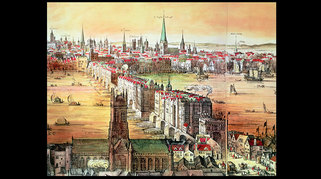 what bad event might have happened here? what bad event might have happened here? Since my first novel, A Murder at Rosamund’s Gate, was published in 2013, I have gotten many questions about my writing process. “Are you a plotter or a pantser?” is the question I most often get. Back then, I didn’t even know what the question meant. Now I know the questioner wants to know whether I outline my books in elaborate detail before I start writing (plotting), or do I go by the seat of my pants (pantsing), figuring out the plot and details as I go. I want to say that I’m usually captivated by an opening image—and that’s what my story revolves around. For my first novel, I have a young woman walking innocently up to a man she knows, who then surprises her by sticking a knife in her gut. Who was this woman? Why did she trust this man? And of course, why did he kill her? (Ironically, the image that inspired A Murder at Rosamund’s Gate never even made it into the final version. I had written it as a prologue, but I worried about starting the story twice. You can check it out here, if you are interested.). However, I've now learned that some things truly need to be figured out before I start writing the book. As I start my fourth Lucy Campion novel, I thought I'd try to share something of my process of thinking through the plot. I have my opening image, and--for now--a one paragraph description of the plot: When the niece of one of Master Hargrave’s high-ranking friends is found on London Bridge, huddled near a pool of blood, traumatized and unable to speak, Lucy Campion, printer’s apprentice, is enlisted to serve temporarily as the young woman’s companion. As she recovers over the month of April 1667, the woman begins—with Lucy’s help—to reconstruct a terrible event that occurred on the bridge. When the woman is attacked while in her care, Lucy becomes unwillingly privy to a plot with far-reaching political implications. So I have my opening image, but now I have to start thinking through all the big questions. Initially, I seem to do this as a reader. Who is this woman? What happened to her? What was this terrible event? Was it something that she witnessed, or is she physically injured. Whose blood is it? Why is she on London Bridge alone?
Then I will start the hard part--thinking through these questions as a writer. I've definitely learned that I need to figure out who the antagonist is from the outset. My natural tendency is to reveal the story to myself (pantsing), probably because I'm naturally more interested in how terrible events affect a community, not why people do terrible things. However, that approach usually means I don't know whodunnit, and that's a challenge for a mystery writer! I usually have to do a lot of backtracking and rethinking motivations and actions, when I have not worked out who the killer is upfront. So then, my next set of questions will be plot-related. What is this terrible event that occurred? Why did it happen? Who caused it to happen? How did this young noblewoman get involved in such a thing? And--sadly enough--I need to figure out if the London Bridge will work as a backdrop. I know it got burnt in the Great Fire, but I'm not sure yet how feasible it is that she ends up there. Then, because Lucy needs to be brought in, I need to figure out what makes this so urgent. Will this woman be attacked under Lucy's care? Probably. Why? What does she know? What are the larger implications of this crime. So, over the next week or so, I will brainstorm these big questions, and from there--voila!--a plot of sorts will emerge for me. I will figure out anchor points, motivations, and subplots from there. Then I will start writing. Every time I hit a roadblock, I will just start the questioning process again, until I figure out the direction I need to take to move forward. So I will call my approach, Plot-Pantsing. What about you? If you are a writer, what approach do you prefer? As a reader, do you think you can tell which approach a writer took?
1 Comment
Augie
7/17/2014 10:14:08 am
Just finished book 2. Ready for the next one!
Reply
Leave a Reply. |
Susanna CalkinsHistorian. Mystery writer. Researcher. Teacher. Occasional blogger. Categories
All
Archives
May 2023
|
 RSS Feed
RSS Feed